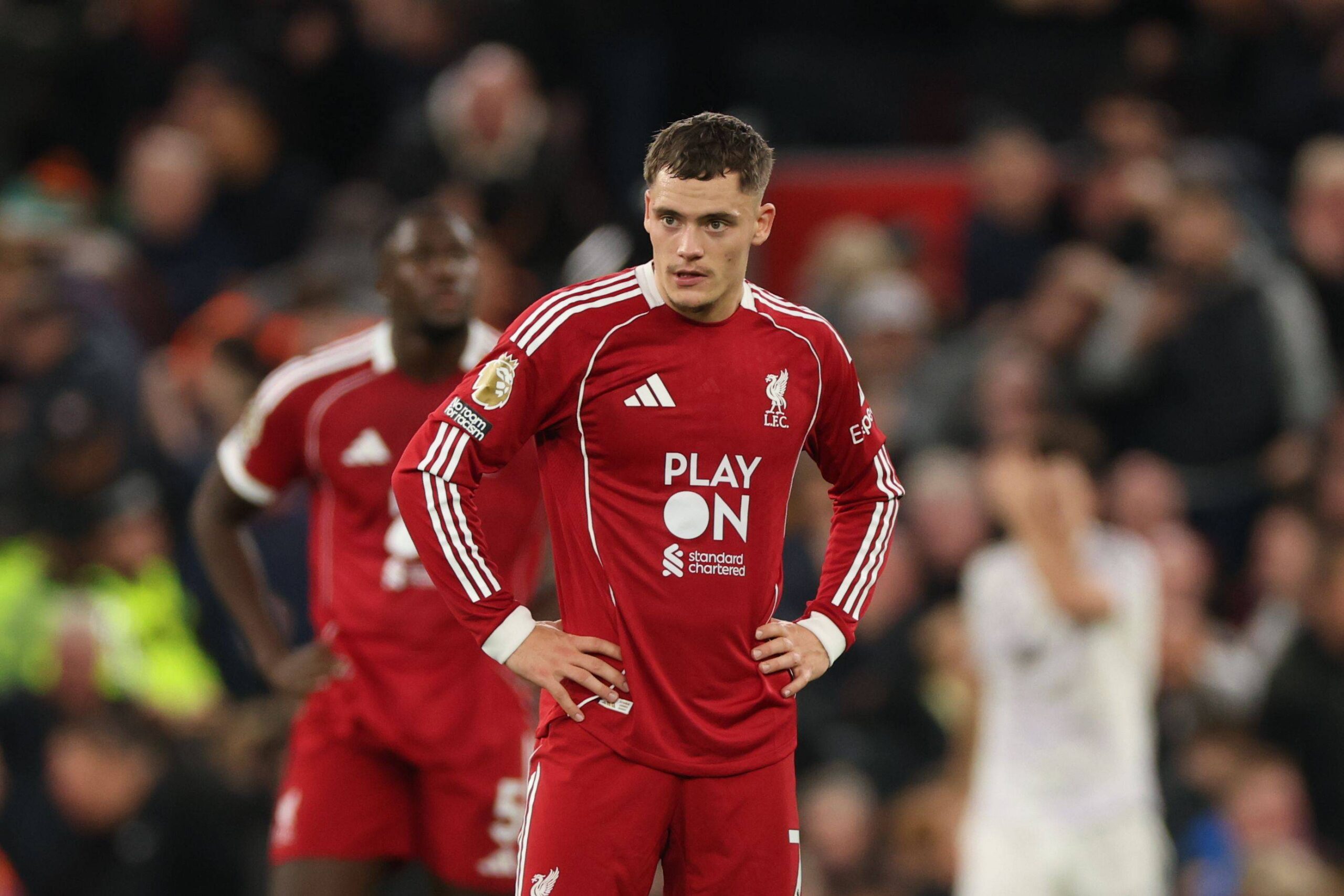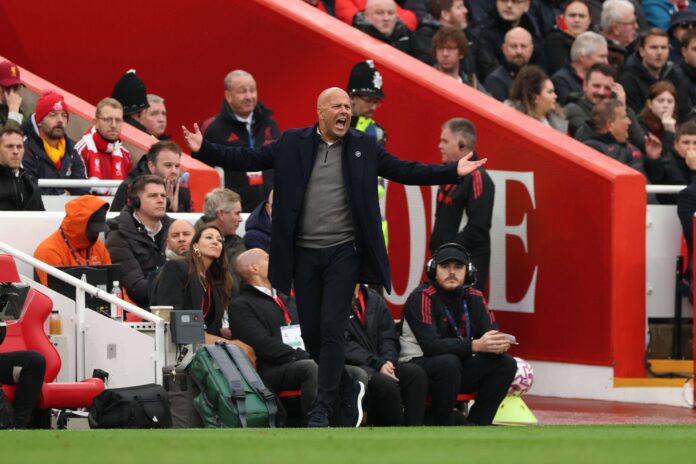Post-Match Raw: Slot Under Scrutiny After Disjointed Liverpool Fall To United
Liverpool’s 2–1 home defeat to Manchester United left the latest Post-Match Raw on Anfield Index sounding less furious than hollow. Anger has given way to a shrugging disbelief at how quickly cohesion has drained from Arne Slot’s side. The consensus from the panel — Trev Downey, Dave Hendrick and Karl Matchett — was stark: this isn’t about one mistake or one selection. It’s about a plan that’s either unclear or unconvincing, and a team whose basic connections have come undone.
“Everywhere you look in this Liverpool team, there is a problem,” Hendrick said. “There’s not one area of this team that’s working right now.” Matchett’s diagnosis was just as blunt when asked if he could at least see a plan that’s failing: “No, not really.” That tone framed the hour: a Liverpool side with possession, territory and shots — and still oddly joyless, shapeless and vulnerable.

Slot’s big job grows bigger
Slot was a constant presence in the discussion — not as a scapegoat, but as the only person who can pull disparate parts into a functioning whole. “He has a big job on right now because he’s the one who has changed things around to what we have got,” Matchett noted. The move towards more 4-2-3-1 behaviours hasn’t established a foundation. Partnerships have withered. “The centre-backs don’t look great together; the full-backs and the wingers aren’t connecting; the nine and the ten aren’t connecting,” Hendrick listed. That failure of combinations — the bedrock of Slot’s previous work — is what jars most.
The midfield sits at the heart of it. Last season’s energetic triangle has become a muddled double pivot that rarely looks like one. The balance between control and protection has tilted the wrong way, exposing the centre of the pitch and forcing fire-fights Liverpool are ill-equipped to manage. As Hendrick put it, the team are “too easy to play through”, with central progression still hesitant and off-ball organisation fraying. Matchett’s solution starts with clarity: pick the shape — double pivot or three — and commit. Everything else, including the roles of the wide forwards and the ten, flows from that.
There were sober words about process rather than panic. The panel were firm that calls to remove the head coach are premature and unhelpful. But they were equally clear that internal conversations must be uncomfortable now: what is Liverpool’s core identity under Slot, and how does he re-establish it with the players already here? Paraphrasing the thrust of the debate: stop searching for perfect systems, start rebuilding reliable patterns.
Tactical disconnects, selection doubts
Selections fed the frustration. Hendrick questioned starting both full-backs in their current roles and the persistence with certain combinations that haven’t worked. The left side, in particular, became a recurring sore point. Overlaps weren’t rewarded, underlaps weren’t seen, and progressive passes were repeatedly turned down. “How many times did we see the full-back actually receive the overlap? How many times did the wide player make the space used?” Matchett asked. Too often, the ball went back, tempo dropped and opponents reset.
Up front, movement and variety were lacking until the changes. Static forwards invited defenders to stay at home, compress the game and wait for mistakes. The pod lauded the impact of the substitutes who simply ran — Curtis Jones to accelerate possession and Federico Chiesa (Kozá) to break lines on instinct. “Jones helped us get a bit of control and up the tempo,” Matchett said. The equaliser came from exactly that kind of directness: Florian Wirtz showing composure on the entry, Chiesa firing a low ball across, Cody Gakpo finishing from close range.
Even so, the broader patterns remained troubling. Liverpool didn’t build sustained pressure after 1–1. Set-piece defending, once an elite strength, cracked at the worst moment. Hendrick’s verdict on the winner was forensic: the initial routine was charged down, but a secondary delivery found Harry Maguire free because of a simple lapse. “It’s a mental switch-off,” he argued, pointing to a midfield runner stepping out and leaving Ibrahima Konaté 1v3 at the far post. The header was good; the structure wasn’t. As Matchett added on a wider theme: “We were smarter than that last season; now we look naive.”
What Slot has to own — and change
A theme emerged: Slot must narrow his focus. First, re-establish a functioning midfield. Decide on the pivot or the three, define responsibilities, and stop asking one player to cover all fire exits. Second, restore repeatable patterns on each flank — full-back to wide player to supporting third man — so Liverpool stop living off first-time crosses and hopeful switches. Third, be braver with in-game interventions. The pod’s view was that reputations can’t drive minutes when the team needs spark and structure.
There were specific nudges. Start Jones on merit: his cameos have raised the floor of Liverpool’s passing and pressing. Keep Wirtz closer to goal rather than dragging him into first-phase build-up. Reward Chiesa’s line-breaking intent with minutes from the first whistle. Above all, put speed back into the attack — in legs and in decisions — so defences are forced to turn and face their own goal, not simply jockey Liverpool’s play back into congestion.
None of this disguises the results — four straight defeats in all competitions — or the optics of losing at Anfield to a United side the panel framed as solid rather than special. But it does offer a pathway. Slot’s greatest task now is less about long-term reinvention and more about re-connecting the simple parts: shape, spacing, tempo, and trust in the pass.
Quotes that define the mood
To reflect the Post-Match Raw tone, here are the key lines on Slot and his Liverpool, some verbatim, some paraphrased for clarity:
• “Everywhere you look in this Liverpool team, there is a problem.” — Dave Hendrick
• “He has a big job on right now because he’s the one who has changed things around to what we have got.” — Karl Matchett
• “The combinations and partnerships… should be primary in modern football. We’re not seeing them.” — Karl Matchett (paraphrased)
• “We look really naive as a team.” — Dave Hendrick
• “This team is not tactically playing at a level. It’s also not technically playing at a level. And there’s no organisation off the ball whatsoever.” — Karl Matchett
• “Set-pieces and secondary balls — we used to be excellent. Now we’re poor.” — Dave Hendrick (paraphrased)
• “Start the players who raise the tempo. Jones has to be in.” — Karl Matchett (paraphrased)
The upshot? Slot’s project isn’t broken beyond repair, but it is drifting without reliable anchors. Post-Match Raw captured that uneasy middle ground: patience with the manager, impatience with incoherence. To change the conversation, Liverpool need visible, simple fixes starting in midfield — and the bravery to stick with them.



